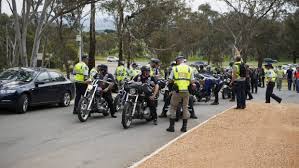Consorting- When it’s a criminal offence to associate with a Criminal
An ABC News article posted yesterday reveals that Freedom of Information documents requested by Greens MP David Shoebridge showed 8,556 consorting warnings were issued to 2,412 people over the past four years. Of that only 54 people were actually charged.
According to the article, anti-consorting legislation was put in place as a means to “disrupt the activities of outlaw motorcycle clubs.” However, critics say that under anti-consorting legislation people are being sent to jail for who they are associating with and not for any criminal offence that they themselves have committed.
When can someone get charged with consorting?
A person is at risk of being charged with ”habitual” consorting if they associate with at least two convicted offenders, separately or together, on two occasions. As per Section 93X of the CRIMES ACT 1900, when a person who consorts with a convicted offender[s], after having been given a warning, continues to associate with a convicted offender then he or she is “guilty of an offence.”
The penalty for a conviction of consorting is a maximum penalty of imprisonment for 3 years, or a fine of 150 penalty units, or both.
As an article in the Sydney Morning Herald states: “only people convicted of an indictable offence can be the subject of an official warning given to others who consort with them.” However, many of the people who received warnings/charges had never been convicted of an indictable offence. Take the case of Parramatta player Corey Norman for example. Norman was in a picture posted on Instagram (since removed by Eels prop Junior Paulo) that shows him in what the media are describing as the private room of a Chinese restaurant with Penrith Panthers’ James Segeyaro and some other men connected with the Nomads bikie gang.
A review by the Ombudsman revealed that police were prone to making mistakes in applying consorting laws. The mistakes can be traced back to the very first person charged under NSW anti-consorting laws. The man charged was a 21 year old NSW man with an intellectual disability who was, before the conviction was overturned, sentenced to nine months in jail just for shopping with some friends. He was by no means a member of any sort of motorcycle gang.
Under South Australia’s anti-consorting laws it does not matter if the person you are accused of consorting with has never been convicted of a crime because suspicion of criminality is enough. It also does not matter when the person was convicted. For example, if your hippie grandmother was charged with smoking pot in the 70’s you still could be charged with consorting.
As highlighted in the ABC News article, the Police claim the laws have been “highly effective in disrupting criminal activity” using the example that of the 54 people charged 42 of the charges were related to outlaw motorcycle clubs.
Critics of Anti-consorting Legislation
The ABC news article quotes the Brotherhood Christian Motorcycle Club who say anti-consorting laws unfairly target marginalized people including the homeless, youth and Indigenous people. For example, according to Tim Vines in the Sydney Morning Herald, a 2013 NSW Ombudsman’s review found that “7% of consorting warnings were directed at youth (13-17 year olds) while Aboriginals were subject to 40% of all consorting provisions.” As Executive member Grant Howard says, the law is bad, it feeds prejudices and stereotypes because it targets people based on how they look and dress; instead of on the basis of criminal behavior. It also gives police too much discretionary power.
Vines says the legislation “criminalises normal social contact and undermines freedom of association.” However, we are no longer in an era where we are judged by the company we keep.
We are more willing to pass laws that support our quest for control in Australia than we are to keep up with our international obligations. According to United Nations article 22(1) of the International Covenant on Civil and Political Rights:
Everyone has the right to freedom of association with others. No restrictions are permitted to be placed on the exercise of this right other than those necessary to protect the interests of national security, public safety, public order, public health or morals, or the rights and freedoms of others.
The anti-consorting legislation is also in contradiction with the Human Rights ACT, which provides for the freedom of assembly and association.
Anti-consorting legislation is also not evidence based law making, the government not providing funding for any cost/benefit analysis of the law since it came into effect in 2009.







